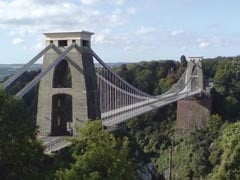Nimbus Conservation, the stone and conservation specialists of Frome, Somerset, have just started work on the £1million first phase of the stonework conservation programme of one of Bristol’s most famous landmarks, the Clifton Suspension Bridge.
The bridge was designed by Isambard Kingdom Brunel when he was 24 but was only completed after his death, becoming a memorial to the world famous Victorian engineer. The bridge finally opened in 1864. Designed for light horse-drawn traffic, it is a testament to the design that it now carries 11-12,000 motor vehicles every day.
The current phase of work got under way by cleaning the masonry using the ThermaTech superheated water system made by Bristol cleaning equipment suppliers Restorative Techniques.
Erecting the scaffolding to facilitate the work on this Grade I listed structure at this height over the Avon Gorge and with a railway track to consider has been no mean feat itself.
It gives Nimbus specialist conservators access to clean and repair the local Pennant stone of the parapet walls and the towers on their abutments of red sandstone built out from the rock of the Gorge.
Supervising the work are the Bristol-based conservators, Ferguson Mann Architects. The work is being paid for, without the aid of any grants from the Lottery or local or central government, with money raised by the charitable trust that maintains the bridge.
The current phase of the work is only part of a project that is expected to go on for 10 years and cost a total of £8million. Much of the money will come from the tolls that people pay to cross the bridge – and those tolls will have to increase to pay for the work.
This is just the latest use of Restorative Techniques’ stone cleaning equipment. It has also been used at the Cafe Royal, Somerset House, William Booth College, Sandhurst RMA, Queen Victoria Memorial in The Mall, York Minster and numerous other cathedrals and churches, The Ritz, Selfridges, war memorials including Coventry (which is also a memorial to the victinms of World War II bombing), London train stations… the list goes on.
Julia Fairchild of Restorative techniques says: “ThermaTech is selling very well. Companies are recognising its rugged versatility, safety features and future-proofed design. Being specified for the Clifton Bridge does tie-in nicely with us as a Bristol company, supplying a famous Brunel-designed project.
“Architects and specifiers now have access to information on our range through all their professional sources – RIBA, IHS Global and so on – so our products are now rapidly appearing on many specification documents as the equipment continues to gain ground."

